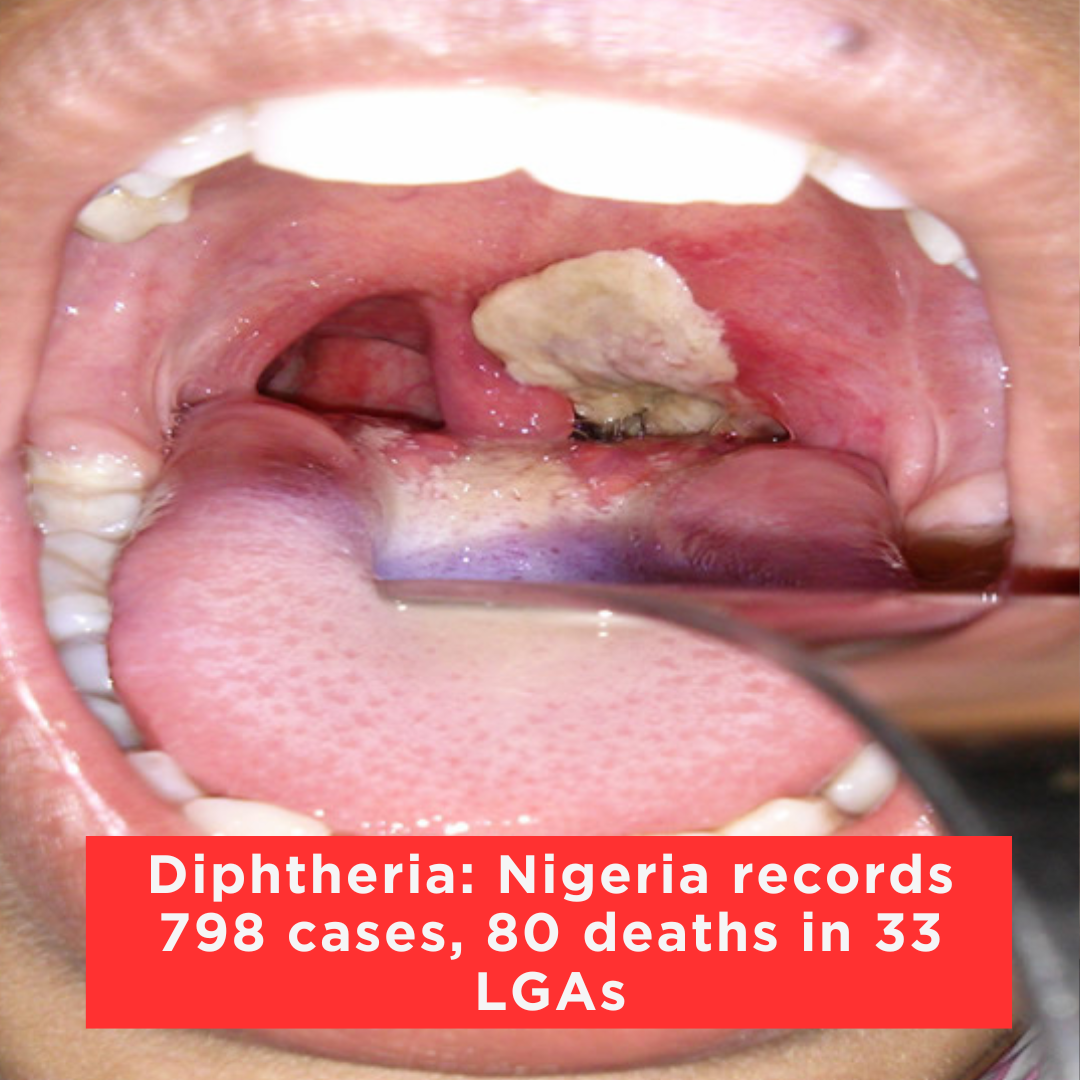According to the latest update from the Nigeria Centre for Disease Control and Prevention, a total of 798 cases of diphtheria have been reported in eight states across 33 Local Government Areas in the country. Sadly, the number of fatalities has reached 80, resulting in a case-fatality ratio of 10 percent as of June 30, 2023.
The NCDC disclosed on Thursday, 6th July in a press statement signed by its Director General, Dr. Ifedayo Adetifa, following the first reported confirmed case of diphtheria in the Federal Capital Territory, Abuja.
The Federal Capital Territory Administration had on Monday announced that the disease claimed the life of a four-year-old child in Dei-dei District of the FCT.
The NCDC, however, said the FCT Health and Human Services Secretariat has activated the diphtheria Incident Management System to coordinate outbreak response activities.
It said as of July 3, 2023, only one confirmed case has been detected in the FCT, with seven suspected cases testing negative, while others are awaiting laboratory results.
The public health institute noted that, since December 2022, diphtheria cases have been detected in Kano, Lagos, Yobe, Katsina, Cross River, Kaduna, Osun states, and the FCT. It said Kano state leads with 782 cases.
“The majority (71.7 percent) of the 798 confirmed cases occurred among children aged two to 14 years. So far, a total of 80 deaths have been recorded among all confirmed cases (case fatality rate of 10.0 percent),” it stated.
Diphtheria is caused by a toxin produced by the bacteria Corynebacterium diphtheria, a vaccine-preventable disease covered by one of the vaccines provided routinely through Nigeria’s childhood immunisation schedule.
Despite the availability of a safe and cost-effective vaccine in the country, the majority, 82 percent of the 798 confirmed diphtheria cases in the ongoing outbreak were unvaccinated, the NCDC said.
“Unfortunately, this also includes this recently announced FCT case. Historical sub-optimal vaccination coverage is the main driver of the outbreak given the most affected age group (two-14-year-olds) observed, and a national survey of diphtheria immunity that found less than half (41.7 per cent) of children under 15 years old are fully protected from diphtheria. Just like in other states reporting cases, we are working with the FCT Health and Human Services Department to implement control measures and avert the further spread of the disease,” the agency noted.
The PUNCH reports that the NCDC activated a multi-sectoral national Diphtheria Technical Working Group as a mechanism for coordinating surveillance and response activities across the country in December 2022.
“We urge the public to remain vigilant and ensure persons with symptoms of diphtheria present early to health facilities for prompt diagnosis and treatment. Early diagnosis and institution of effective treatment are key predictors of a favourable outcome. Healthcare workers are urged to notify LGA disease surveillance officers immediately once they see a suspected case,” the NCDC advised.
Related post: https://www.medburymedicals.com/ncdc-denounces-misinformation-about-monkeypox-in-nigeria/
What is Diphtheria?
Diphtheria is caused by the bacterium Corynebacterium diphtheriae. It spreads through respiratory droplets or direct contact with an infected person. The bacteria release toxins that primarily affect the respiratory system, leading to a range of symptoms.
Common Symptoms of Diphtheria
Diphtheria commonly starts with a sore throat that worsens over time. It can also lead to the formation of a thick, grayish-white coating in the throat or tonsils, causing difficulties in breathing and swallowing. Swelling and tenderness of the neck due to enlarged lymph nodes are also observed. Additionally, individuals with diphtheria often experience a moderate to high fever. These symptoms serve as important indicators of the presence of the disease and should prompt immediate medical attention.
Prevention Measures of Diphtheria
Vaccination: The most effective way to prevent diphtheria is through vaccination. The DTP vaccine, which protects against diphtheria, tetanus, and pertussis, is part of routine immunization schedules in Nigeria. Ensuring timely vaccination is crucial for individuals of all ages.
Improved Hygiene Practices: Encouraging proper hand hygiene, covering the mouth and nose while coughing or sneezing, and avoiding close contact with infected individuals can help reduce the risk of transmission.
Timely diagnosis and treatment are crucial. If you or someone you know experiences symptoms suggestive of diphtheria, seeking medical attention immediately is essential. Early diagnosis allows for timely intervention and prevents complications.
Source: Healthwise/Punch








No Comments